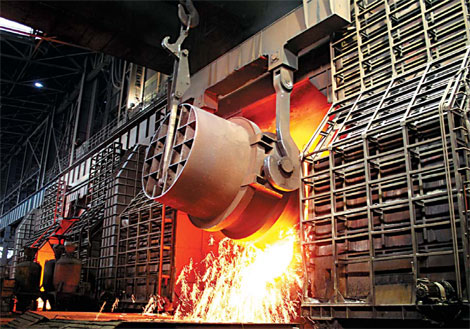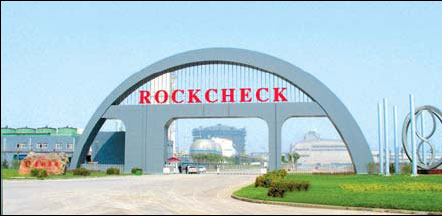


During the devastating Sichuan earthquake in May, a dead mother moved many Chinese people to tears.
The body was found together with a mobile phone the mother was holding. She used her body to protect her baby girl, who survived the earthquake. Before dying, the mother typed a short text message on her mobile phone: "Dear baby, if you survive, please remember that I love you".
It particularly moved a 40-year-old steel magnate Zhang Xiangqing - founder of Tianjin Rockcheck Steel Group.
Zhang was moved to tears and made a donation of 100 million yuan, one of the largest by an individual on the mainland, for the rescue and rehabilitation of earthquake victims.
"Actually, I was that baby 32 years ago," Zhang tells China Business Weekly.
In 1976 Zhang was an 8-year-old boy when the devastating 7.8-magnitude Tangshan earthquake in Hebei province struck China, killing more than 240,000 people. Like the baby girl, Zhang survived in his mother's arm, but became an orphan.
It's extremely difficult for a Chinese orphan to survive, not to mention starting a business and striking it rich.
But 32 years later, Zhang has become a steel tycoon whose company is now ranked as one of China's three largest smelters. Rockcheck posted 24.5 billion yuan in revenue in 2007 and paid a tax of 2.97 billion yuan, the largest taxpayer in Tianjin.
Losing parents dealt a big blow to Zhang, but thanks to the help from many people, including some strangers, Zhang was able to make a living and later started up his own businesses.
But that still meant Zhang had to work harder than others his age and maintain an iron resolve in the face of any difficulty or disaster.
That has taught him honesty, diligence and a never-say-die spirit, which has helped Zhang lead his "steel fleet" sail through many twists and turns, he says.
In 1983, at age 15, Zhang became a worker at a small steel-smelting factory in Tangshan.
"When I stood beside the steel-making furnace the first time, the red, hot molten steel fascinated me," he says.
But the negligible wages could hardly sustain the boy's life, so three years later he started selling tofu (beancurd).
"But the dream of returning to smelt steel in the future was still on my mind," Zhang says.
He was waking up at 3 am to make tofu so that he could start selling it in the morning. Within five years, he made 10,000 yuan, with which he began his steel business in 1991 by selling scrap steel.
But that initially proved to be a wrong decision. Zhang was soon cheated out of all his money.
"As a newcomer to the industry, I couldn't tell which kind of scrap steel could be recycled," Zhang recalls.
That was the second biggest blow to Zhang since 1976, but he was not discouraged. Again, this time with help from others, including friends, Zhang started a steel-exchanging business in 1992.
At that time Zhang still woke up at 3 am, as he did when making tofu, to leave for Beijing to buy scrap steel and return to Tianjin at 10 pm.
He was so busy and tired that his wife had to help him wash his hair as he fell asleep in bed.
As he gradually accumulated experience in the industry his diligence and honesty paid off.
Zhang reportedly never defaults on payments to his customers, employees and taxes, which helped him establish a good reputation and forged strong customer relationships.
In 1993 Zhang made 3 million yuan and since then he has been on a roll.
Bold acquisition
But his major turning point came in 2001.
In that year, Zhang heard that Bohai Metallurgy Industrial Group, based in the eastern seaside town of Gegu in Jinnan district, part of today's Tianjin Binhai New Area, was up for sale.
He rushed to the small plant, which was on the verge of bankruptcy, with his friends and just four days later to the surprise of many he made the bold decision to buy the plant.
The township-owned plant was completely idle at the time and the site abounded with stumps and weeds, with some villagers raising livestock there.
Zhang bought it for 280 million yuan and later renamed it Rockcheck. He invested around 60 million yuan from his former factory's profits to retool the new plant and resumed manufacturing within 14 days. Eventually he turned it into one of the most profitable enterprises in Tianjin.
The acquisition was not a hasty decision, Zhang says.
"Tianjin is a port city with sound transportation facilities, which is quite helpful for a steel manufacturing factory," he explains, adding that Tianjin also has great potential for the iron market.
Within weeks the new plant secured large orders from Tianjin's largest steel maker, Tianjin Steel Industrial Group.
And in that same year, the central government decided to reform the steel industry, encouraging Tianjin to open a steel and iron transportation business, as Zhang had anticipated.
Supply agreement
However, in 2003 Rockchek found the market quite challenging due to a slump in international iron ore prices.
Steel companies were in a dilemma because they were not sure when prices would hit bottom and when they should place the orders.
So when an executive of Australian Park River's iron ore company went to Tianjin to look for buyers, he was turned down by almost all the local companies.
Discouraged, the executive walked along the street in Gegu town in Tianjin and saw Tianjin Rockcheck Group sign. He knocked at the doors for a last try.
To the Australian executive's surprise, Zhang agreed with his proposal.
Park River signed a ten-year agreement with Zhang to supply a total of 40 million tons of iron ore for only 20 billion yuan, a fairly low-priced deal.
That proved to be the right decision. The price of iron ore kept surging in the following years. It grew 18.6 percent in 2004, followed by 71.5 percent in 2005.
The growth shrank in 2006 and 2007 by 10 percent and 9.5 percent respectively but is forecast to rise 96.5 percent this year.
The 10-year supply deal helped shield Rockcheck from the risks brought by the soaring raw material prices
China's demand for iron ore has been on a sharp rise and is expected to maintain the momentum in the coming years.
With his domestic rivals now busy negotiating with suppliers over prices, Zhang can rest easy. The 10-year supply deal has already given him an upper hand.

(China Daily 08/18/2008 page12)













